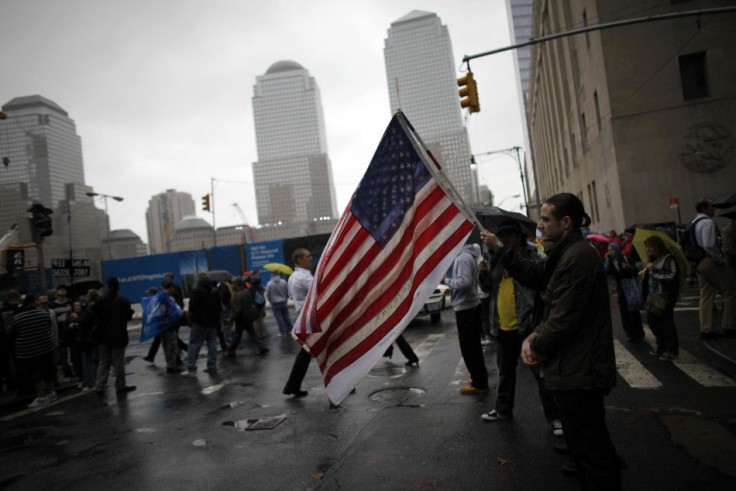9/11 Cancer Link Finally Recognized, But Funds For Responders And Volunteers May Be Lacking

The National Institute for Occupational Safety and Health recognized Monday about 50 forms of cancer as byproducts of being near Ground Zero during and in the months following Sept. 11, 2001, reports Reuters.
The formal recognition by the federal government under the Zadroga 9/11 Health and Compensation Act opens the door to monitoring and treatment for survivors, first responders and nearby residents who have suffered from such diseases, as well as compensation for relatives of those that died.
Dr. John Howard, NIOSH's administrator of the World Trade Center Health Program, decided the toxic mix of debris, burning chemicals and dust, which smoldered for months, was enough to cause cancer for those near Ground Zero.
The list of new qualifying diseases includes nose, stomach, colon, lung, oral, liver, breast, renal and childhood cancers, according to the New York Daily News.
The conclusion, which took months to arrive at, "marks an important step in the effort to provide needed treatment and care to 9/11 responders and survivors," Howard said, according to Reuters.
The updated regulations become effective 30 days after they are published in the Federal Register. Then a clearer picture of 9/11's true toll should emerge as cancer victims and patients come forward.
An estimated 1,000 people have died from illnesses, including cancers, caused by the 9/11 attacks, according to Reuters. The addition of cancer as a 9/11-related illness will increase the number of claims for compensation, as well as the ranks of those whose are monitored and treated.
"We are getting sick in record numbers," Ray Pfeiffer, a first responder battling kidney cancer, told NBC News. "It's fantastic news."
Victims' families are entitled to monetary benefits from the $2.77 billion Sept. 11th Victim Compensation Fund. The fund's pool of money has not been increased, so everyone's share of proceeds drops as more claims are made.
The fund's special master, Sheila Birnbaum, is permitted to spend only $875 million of the total within the first five years. The remaining $1.9 billion will be open to her in the sixth.
The New York City Fire Department recently added nine names to a memorial for its members who died following 9/11 from illness, bring the total honored there to 64.
One study showed responders are 19 percent more likely to get cancer, according to the Lancet.
"They're going to add cancers, but are they going to add more money to the fund?" Thomas Gilmartin, who suffers from lung disease and sleep apnea, told the Post. "It's crazy. Every time, we gotta fight. It's two years since Obama signed that bill, and nobody's got 10 cents."
Cancer's addition will also increase the number of responders and volunteers nationwide being monitored and treated for 9/11-related illnesses. Currently, 20,000 Ground Zero workers are being treated and 40,000 are being monitored, according to Reuters.
The Zadroga Act, named after NYPD Detective James Zadroga, who died at age 34 after working on the World Trade Center pile, was signed into law by President Barack Obama two years ago, meant to cover and compensate those directly affected by the Sept. 11, 2001, terrorist attacks on New York City. The bill, authored by Rep. Carolyn Maloney, D-N.Y., took 10 years to pass. She sought $6.2 billion for the fund, but Congress reached an accord at $2.7 billion, according to the Washington Post.
Members of Congress accepted the deal in the hopes to revisit the issue within the next six years, according to a congressional source who requested anonymity.
The levels of compensation per claim will significantly decrease as an influx of cancer deaths comes to the fore, leaving the possibility of further congressional action in the coming years.
Maloney, along with Reps. Jerry Nadler, D-N.Y., and Peter King, R-N.Y., expressed the need to revisit the compensation levels in the future.
"We need to start working to extend the Victims Compensation Fund past its current end point in 2016 in order to ensure that responders and survivors who develop these cancers after that will be able to receive compensation," they said in a joint statement.
Ensuing bureaucratic wrangling and scientific research left many lacking coverage as the list of illnesses expanded. Cancer, which is slow to form, causes epidemiological issues for researchers and doctors, who face chicken-egg quandaries when determining causes. For example, some first responders were also smokers and subsequently developed lung cancer.
Yet New York City's firefighters remain hopeful more funding will come in the future.
"We're very optimistic that we're going to get that funding when the time comes," said Deputy Chief Richard Alles, who is legislative director for the Uniformed Fire Officers Association. "Dr. Howard, I have only good things to say about him. He does get it. Cancer is one of those unique things. The toxic mix that people were exposed to was unique. It kind of changed everything."
© Copyright IBTimes 2025. All rights reserved.


















